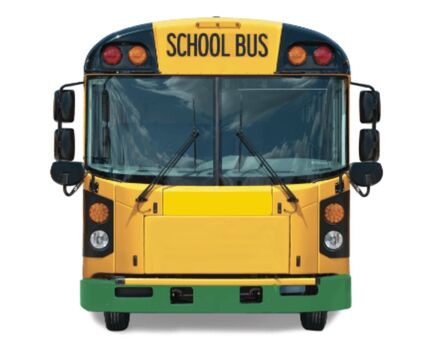Summerland receives grant for electric bus, charging station
December 29, 2022

Summerland Public School is the recipient of a grant for an electric school bus. A charging station is also included in the grant package.
Summerland Public School students will go green next year - at least on one route - as an electric bus is added to the district's fleet.
Board of education members approved acceptance of a $395,000 grant that will cover the purchase of a bus and a charging station to be installed at the school.
The district was notified earlier this fall it was one of six Nebraska recipients of a grant to purchase an electric bus.
Other districts receiving the grant include Hay Springs, Hershey, McCool Junction, Raymond Central and Southern.
In earlier discussions this fall, board members directed Superintendent Kyle Finke to find answers to questions and concerns about the bus, if the district would accept it.
During the board's Dec. 14 meeting, Finke said, "If your bus is over the amount of the grant, a (second) grant kicks in, so the bus, itself, will be fully paid for."
A 59-passenger bus runs $398,182, while a 71-passenger costs $402,819.
"Any amount over the $375,000, which the grant covers, will be taken care of by the Clean school Bus program," the superintendent reiterated.
Nebraska Public Power District will install the charging station.
Finke said,"We're a public entity. They will take care of 90% of the amount. That leaves 10% to be paid for by $20,000 from the grant."
Steve Thiele asked if the public could use the charging station.
Finke said he believes since it is through NPPD, public access will be required.
"They pay for power usage? I assume it's metered so they know what to charge," Thiele said.
Yes, according to Finke.
The electric portion of the bus is made by Cummins. Batteries usually have an eight-year life-span. Battery packs are insulated.
The bus will require charging every 120 miles. A level-two station will take eight hours to charge the bus, while a level-three charger will take three hours.
According to grant parameters, the district will need to keep the bus in its fleet for five years.
According to Finke, these types of buses have been in service in Colorado and, after eight years, batteries still have 75% capacity.
"We'll strictly use it as a shuttle bus," Finke said.
The Clearwater shuttle bus is the next bus on the district's list to replace.
"When we bought our last bus, we traded two buses and it cost us $89,000 after the trade-in. I don't think we can touch a bus for less than $105,000," Finke said.
The current Clearwater shuttle bus will be decommissioned through the program once the new vehicle is delivered.
"Ultimately, we should be able to use our bus for almost a whole week without having to recharge," Finke said.
During colder months, battery life will decrease somewhat, due to warming time.
President Ed Nordby asked if the current shuttle bus will last another 10 months.
"We're hoping it gets there the rest of the year, I didn't plan otherwise," Finke said.
Board member Nate Schwager asked what the cost would be to replace batteries?
Finke said the cost would run approximately $90,000, and was told by a bus company spokesman by the time batteries would require replacement, "you'd be moving on to a different bus."
Finke said the district could turn down the grant and reapply at another time.
Thiele asked Finke for his recommendation.
"I know this is a political firestorm, somewhat, because of diesel and electric. A situation where we're going to be given a bus through a grant and a charging station, and it's not going to cost the district. Otherwise, we have to order a bus and I'm going to have to take a penny out of the budget somewhere and use it toward a new bus," Finke said.
Currently, the manufacturer delivery time is eight to 10 months out.




Reader Comments(0)